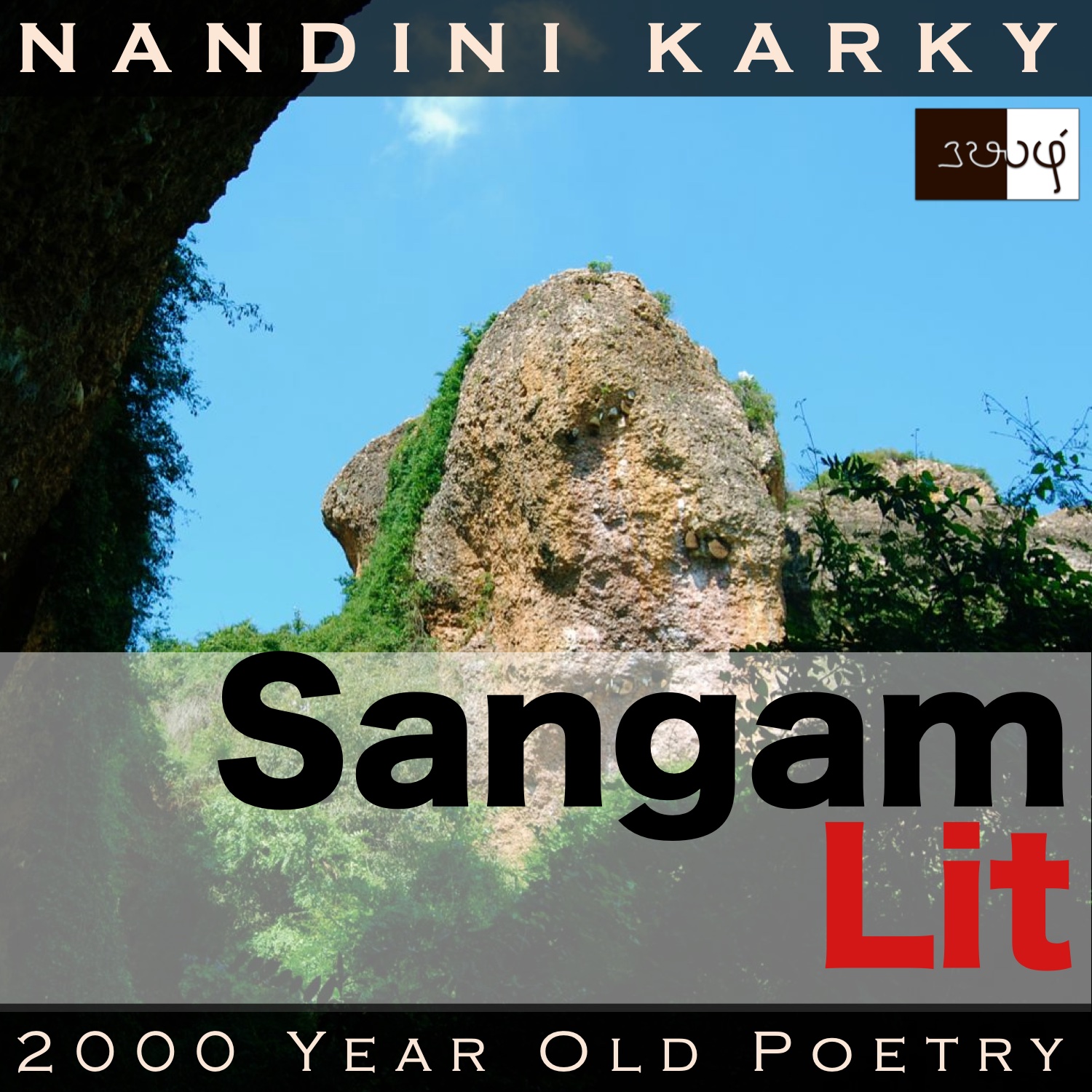Podcast: Play in new window | Download
Subscribe: Apple Podcasts | Spotify | Amazon Music | Android | iHeartRadio | TuneIn | RSS | More

In this episode, we perceive an angry sort of determination, as portrayed in Sangam Literary work, Kurunthogai 218, penned by Kotranaar. Set in the drylands of ‘Paalai’, the verse speaks in the voice of the lady to the confidante, in response to the friend’s concern about the lady’s ability to bear with the man’s parting.
விடர் முகை அடுக்கத்து விறல் கெழு சூலிக்குக்
கடனும் பூணாம்; கைந் நூல் யாவாம்;
புள்ளும் ஓராம்; விரிச்சியும் நில்லாம்;
உள்ளலும் உள்ளாம் அன்றே-தோழி!-
உயிர்க்கு உயிர் அன்னர் ஆகலின், தம் இன்று
இமைப்பு வரை அமையா நம் வயின்
மறந்து ஆண்டு அமைதல் வல்லியோர்மாட்டே.
‘I shan’t do any of this, for he cares not’, says a voice in this verse. The opening words ‘விடர் முகை அடுக்கத்து விறல் கெழு சூலி ‘ referring to ‘Goddess Sooli in the hills, filled with clefts and caves’, for some reason, brought before my eyes, the Gudiyam caves, near Chennai, a pre-historic rock shelter, where I have glimpsed at curious symbols drawn on curving walls of caves and clefts. Returning to the historic age, we next see mention of ‘கைந் நூல்’ which is ‘a holy thread tied to one’s hand, after praying to a deity’, known in contemporary Tamil as ‘Nonbu Kayiru’. In the words ‘உள்ளலும் உள்ளாம் அன்றே’ meaning ‘not think about, within the mind too’, there’s hint of a statement made in a moment of ire. The phrase ‘உயிர்க்கு உயிர் அன்னர்’ details the poetic portrait of someone meaning ‘he who is the life of my life’. Ending with the words ‘மறந்து ஆண்டு அமைதல் வல்லியோர்மாட்டே’ meaning ‘he has the capability to live part forgetting’, the verse welcomes us to listen with empathy.
Goddesses, holy threads and angry vows seem to pack a powerful punch! The context reveals that the man and lady were leading a happy, married life when the man parted away on a mission. Days passed by and there was no sign of the man. Worrying about her friend’s health, the confidante asks if they should perform some rituals for the speedy return of the man. To the confidante, the lady says, “In the clefts and caves of mountain ranges, to the victorious goddess ‘sooli’, neither shall we offer sacrifices, nor shall we tie the holy thread on our hands; Neither shall we wait for bird omens nor the good words of foretellers; We shall not even think, my friend! For, even though he is the life of my life, and I cannot be apart from him for even the blink of an eye, he has the strength to forget me and stay away!” With these words, the lady expresses how her heart has turned steely in the wake of what she sees as the man’s apathy towards her state.
Time to explore the nuances. The lady starts by talking about the Goddess Sooli, who reigns over in the clefts and caves of the ranges, and mentions that they should offer no sacrifices to this deity. She continues by adding that they shouldn’t be wearing any prayer threads too. This is followed by the lady’s instructions that they shouldn’t be looking out for bird omens or waiting for the good words of soothsayers. After mentioning all these external events, the lady takes it a notch further and says that they shouldn’t even think about it. So far, what we have seen is a ‘Not to do’ list! Why is the lady detailing so many steps of what they shouldn’t do and what is that she shouldn’t even think about? Let’s listen further to find out!
After that list of ‘anti-instructions’, the lady talks about how the man was like the life of her life, and how it was impossible for her to be apart from him even for the time it takes to blink one’s eyes. Even though the man knows of this, he seems to have the power to forget the lady and stay away for so long, the lady concludes. And, now we know this is an angry outburst at someone, whom a person thinks does not reciprocate the love and care they feel. Here she was pining away so and yet, the man stays away. ‘How could he?’ is the lady’s burning question here!
In the moment of outburst, the lady tells us all the rituals a lady separated from the man does, to ensure his safe return, such as praying to goddesses, offering sacrifices, tying prayer threads, listening to bird and people omens. While it may be easy not to do all these things in a fit of anger, how about the last one? Can you decide not to think of someone and win at that? Even in a moment when a person exults thinking that they have not thought of someone, they have lost and are thinking of the other. It’s an impossible dream to command one’s mind not to think of someone or something instantly. And so, the verse gently whispers what the lady would soon realise that it isn’t anger that’s going to help but patience to wait or patience to let the mind let go!




Share your thoughts...